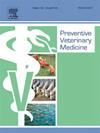Perceptions and attitudes toward control of invasive monk parakeets (Myiopsitta monachus) in citizens from Santiago metropolis, Chile
IF 2.2
2区 农林科学
Q1 VETERINARY SCIENCES
引用次数: 0
Abstract
The monk parakeet, one of the world’s most invasive birds, has thrived in urban areas and causes environmental, economic, and health impacts. These challenges underline the need for control measures, though public perception can affect efforts. This study explores attitudes toward monk parakeet management among residents from Santiago, Chile. Five-hundred and four online surveys were applied and distributed through online social networks aimed at inhabitants in the Metropolitan Region. Although most citizens recognize that the parakeets can produce environmental impact, respondents do not consider them as a threat to health or the economy. Seventy percent of participants believe there should be a population control program for monk parakeets in place, and the control method is not significantly related to people’s support. Sixty percent of respondents support parakeet eradication if they cause damage to native species or if they transmit pathogens to humans or other animals. However, this acceptability decreased considerably if eradication is conducted due to economic damages. Our results demonstrate that, despite a high level of appreciation to parakeets, there is a general willingness to support its management, including eradication, in pursuit of biodiversity conservation and public health. However, citizens need information to know the threats of this invasive bird, given that management initiatives will receive greater support when society understands the potential parakeet impact on environmental, health, or economic realms and when specific and compelling methods are used. It is important for decision-makers to acknowledge beliefs and concerns that could hinder the management of monk parakeets in order to prevent social conflicts.
智利圣地亚哥城市居民对僧鹦鹉入侵控制的认知和态度
僧侣长尾小鹦鹉是世界上最具入侵性的鸟类之一,在城市地区蓬勃发展,对环境、经济和健康造成了影响。这些挑战强调了采取控制措施的必要性,尽管公众的看法会影响努力。本研究探讨智利圣地亚哥居民对僧侣长尾小鹦鹉管理的态度。采用了540份在线调查,并通过针对大都市区居民的在线社交网络进行了分发。虽然大多数公民认识到长尾小鹦鹉会对环境造成影响,但受访者并不认为它们对健康或经济构成威胁。70%的参与者认为应该有一个和尚长尾小鹦鹉的数量控制计划,控制方法与人们的支持度没有显著关系。60%的受访者支持根除长尾小鹦鹉,如果它们对本地物种造成损害,或者如果它们将病原体传播给人类或其他动物。然而,如果由于经济损失而进行根除,这种可接受性将大大降低。我们的研究结果表明,尽管人们对长尾小鹦鹉高度赞赏,但为了保护生物多样性和公众健康,人们普遍愿意支持对其进行管理,包括根除。然而,公民需要了解这种入侵鸟类的威胁,因为当社会了解长尾小鹦鹉对环境、健康或经济领域的潜在影响时,以及当使用具体和令人信服的方法时,管理举措将得到更大的支持。对于决策者来说,重要的是要承认可能阻碍和尚长尾小鹦鹉管理的信念和担忧,以防止社会冲突。
本文章由计算机程序翻译,如有差异,请以英文原文为准。
求助全文
约1分钟内获得全文
求助全文
来源期刊

Preventive veterinary medicine
农林科学-兽医学
CiteScore
5.60
自引率
7.70%
发文量
184
审稿时长
3 months
期刊介绍:
Preventive Veterinary Medicine is one of the leading international resources for scientific reports on animal health programs and preventive veterinary medicine. The journal follows the guidelines for standardizing and strengthening the reporting of biomedical research which are available from the CONSORT, MOOSE, PRISMA, REFLECT, STARD, and STROBE statements. The journal focuses on:
Epidemiology of health events relevant to domestic and wild animals;
Economic impacts of epidemic and endemic animal and zoonotic diseases;
Latest methods and approaches in veterinary epidemiology;
Disease and infection control or eradication measures;
The "One Health" concept and the relationships between veterinary medicine, human health, animal-production systems, and the environment;
Development of new techniques in surveillance systems and diagnosis;
Evaluation and control of diseases in animal populations.
 求助内容:
求助内容: 应助结果提醒方式:
应助结果提醒方式:


